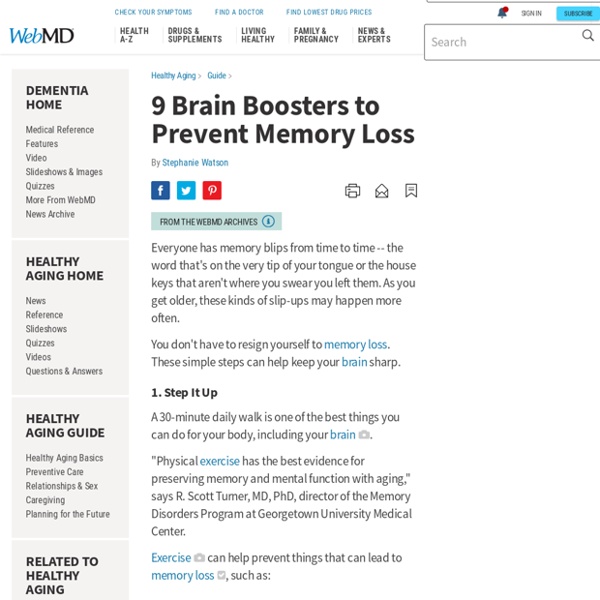



https://www.webmd.com/healthy-aging/guide/9-brain-boosters-to-prevent-memory-loss#1
Related: M C IMemory loss: 7 tips to improve your memory Memory loss: 7 tips to improve your memory Try these simple ways to improve your memory. By Mayo Clinic Staff Can't find your car keys? Forget your grocery list? Can't remember the name of the personal trainer you liked at the gym? Understanding dementia – Alzheimer's Disease Association Dementia is an illness which affects the brain, causing the brain cells to die at a faster rate than normal. It is NOT normal ageing. As a result, the mental abilities of the person with dementia declines. This leads to failing memory, deterioration of intellectual function and personality changes. Who is Affected? Symptoms of Forgetfulness and Memory Loss in the Elderly – Memory loss and forgetfulness are often intrinsically connected with the aging process. Elderly people often become worried about becoming forgetful. And this forgetfulness can become the initial sign of Alzheimer’s disease.
Six Things Seniors Can Do To Improve Memory "What was it I was looking for in the frigde?" "What was it I was supposed to get at the store?" "What's your name again?" How to Improve Your Memory: Tips and Exercises to Sharpen Your Mind and Boost Brainpower Whether you’re looking to sharpen your mind, boost your mental performance, or preserve your memory as you age, these tips can help. How to boost brain power at any age A strong memory depends on the health and vitality of your brain. Whether you’re a student studying for final exams, a working professional interested in doing all you can to stay mentally sharp, or a senior looking to preserve and enhance your grey matter as you age, there’s lots you can do to improve your memory and mental performance.
Preventing Memory Loss With Aging She could deal with constantly forgetting her shopping list, and she'd made a habit of writing down where she'd parked her car, each and every time. But in her mid-50s, Janis Mara's memory problems started costing her money. Late fees began piling up because she forgot to pay her bills. "Over time, it really intensified," she says.
What are the early signs and symptoms of dementia? Worried about problems with your memory? Concerned about the increasing forgetfulness of a partner, parent or family member? Here’s how to spot the first symptoms of dementia While everybody can experience a momentary slip of memory – misplaced keys or a forgotten name – if you or someone you know is repeatedly suffering particular memory problems, it may be worth taking note of the symptoms. And while it may not be caused by Alzheimer’s disease, vascular dementia or other neurodegenerative problems, it may be worth getting it checked out in case there is an underlying health problem that’s causing the memory loss. Because, while it’s not always easy to differentiate between normal ageing, mild cognitive impairment and dementia, there are some very distinct early symptoms of dementia.
Do Memory Problems Always Mean Alzheimer's Disease? Many people worry about becoming forgetful. They think forgetfulness is the first sign of Alzheimer's disease. But not all people with memory problems have Alzheimer's. Other causes for memory problems can include aging, medical conditions, emotional problems, mild cognitive impairment, or another type of dementia. Memory Loss & Forgetfulness: Causes, Symptoms, Treatments Many older people worry about becoming more forgetful. They think forgetfulness is the first sign of Alzheimer's disease. In the past, memory loss and confusion were considered a normal part of aging. Free Memory Loss Tests - MemoryHealthCheck Test your memory health and function with these free online screening tests: Short term memory is the ability to form and retain very recent memories, such as what you had for breakfast this morning, and recalling details from a news article that you read 10 minutes ago. Try out these short term memory tests: When people become concerned about “short term memory loss”, they are typically referring to real or perceived impairments in the ability to form new episodic and semantic memories. Working memory is the capacity to hold small amounts of information in an active, easily accessible state. Working memory is important for learning new information and new skills.
Age-Related Memory Loss: What's Normal, What's Not, and When to Seek Help Worried about your forgetfulness? Learn what’s normal when it comes to memory and aging, and how to recognize the signs of more serious problems. Memory and aging Memory screening for those who keep forgetting things, Health News Being forgetful can simply be a reflection of ageing - but it can also spell something more sinister. It may, for instance, point to a heightened risk of getting dementia down the line. People who have memory- related or cognitive problems - such as in making decisions or judging the steps needed to carry out a complex task - may benefit from a memory screening test. How to Prevent (and Even Reverse) Age-Related Memory Loss Eric Kandel: There are two major forms of learning: implicit or explicit or declarative and non-declarative. The simple form of learning, which I studied in Aplysia, which holds true for all invertebrate animals, is learning of perceptual and motor skills. More complex learning involves the hippocampus requires conches participation and it involves learning about people, places and objects. So two different systems, implicit learning, which does not involve conscious participation, involves a number of systems in the brain. In the simplest cases just reflects pathways themselves, but in other cases it could involve the amygdala for emotional learning, the basal ganglia for some motor tasks.